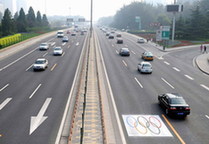历时近两个月的北京奥运会、残奥会已经结束。除了精彩的赛事外,北京的蓝天白云和交通顺畅给人们留下了深刻印象。单双号实行以来,市民普遍反映北京的空气质量好了,交通拥堵现象少了,更有人呼吁将单双号进行下去。奥运后如何保证这样的效果?从今天开始成了摆在北京面前的一个难题。

|

|
|
Beijing return to normalcy with construction resuming, factories restarting operations and all cars allowed once again on the roads after its hosting of the recent Olympics and Paralympics. [file photo]
|
Debate on the future of Beijing's air quality has continued amid the capital's return to normalcy after its hosting of the recent Olympics and Paralympics - with construction resuming, factories restarting operations and all cars allowed once again on the roads.
"We feel that the Olympics is the best thing that could have happened to air quality in the sense that it has put air quality fair and smack on the agenda," said Cornie Huizenga, executive director of the Manila-based Clean Air Initiative for Asian Cities, a network of governments, private sector and nongovernmental groups.
Drastic restrictions on private car use had taken half of Beijing's 3.3 million vehicles off the roads and shuttered polluting factories. Dust-spewing construction in the capital had also been halted.
The period gave Beijing's 17 million residents a chance to experience clear summer skies, as the city recorded its lowest pollution levels for the month of August in 10 years.
The cleaner air also sparked public debate over whether to extend some measures, especially the traffic restrictions that kept cars off the road on alternating days, depending on whether their license plates ended in odd or even numbers.
Beijing said earlier this month restrictions on government-owned vehicles, which make up 10 percent of the city's 3 million-plus total, will continue for the time being. For drivers, the crunch will begin today, the first workday with all cars allowed back on the road.
Authorities have made no public announcements about resuming the controls on private cars but are encouraging citizens to discuss the option. Lively, vigorous debate has played out on Internet forums, radio stations and newspapers in recent weeks.
Generally, private car owners were reportedly more likely to oppose more restrictions on vehicles, while non-car owners were more likely to approve.
One newspaper editorial contended the odd/even restrictions are unlikely to succeed.
"People who have some brains should know the result of long-term restrictions. The family that owns one car will have two, while poor people will still be stuck in traffic on buses," Gao Sai wrote in the Guangming Daily.
(China Daily)

(英语点津 Helen 编辑)